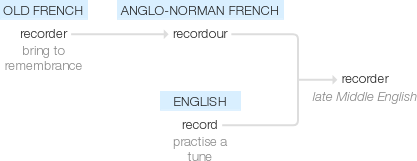Recorder
late Middle English (denoting a kind of judge): from Anglo-Norman French recordour, from Old French recorder ‘bring to remembrance’; partly reinforced by the verb record (also used in the obsolete sense ‘practise a tune’: see recorder (sense 4)).
wiktionary
From Middle English recordour, borrowed from Old French recordour, from Old French recordeor, from Medieval Latin recordātor, from Latin recordor(“call to mind, remember, recollect”), from re-(“back, again”) + cor(“heart; mind”).
From Middle English recorder, from record(“to practice (music)”).
etymonline
recorder (n.1)
early 15c., recordour, "chief legal officer of a city," whose duty is to register writings or transactions, from Anglo-French recordour (early 14c.), Old French recordeor "witness; storyteller; minstrel," from Medieval Latin recordator, from Latin recordari "remember" (see record (v.)). The meaning "registering apparatus" is from 1873.
recorder (n.2)
"musical instrument having a long tube with seven holes and a mouthpiece," early 15c. (earlier recordys, mid-14c.), from record (v.) in an archaic sense of "quietly sing or repeat a tune, practice a tune," used mostly of birds. Darwin, writing of birds in "The Descent of Man," says, "The young males continue practising, or as the bird-catchers say, recording, for ten or eleven months."
The musical instrument was known to Shakespeare and Milton ("In perfect phalanx to the Dorian mood/Of flutes and soft recorders," "Paradise Lost"), but the name, and the device, were rarely heard by mid-1800s (it is marked "obsolete" in Century Dictionary, 1895), ousted by the flute, but both enjoyed revival after 1911 as an easy-to-play instrument for musical beginners.
Seynte Aldelme diede in this tyme havynge in habite and in use instrumentes of the arte off musike, as in harpes, pipes, recordres. [Higden's "Polychronicon," 15c. translation]
